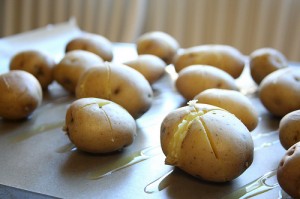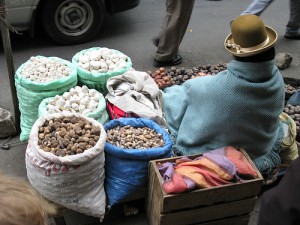 I am totally in love with potatoes. I’m getting married in two weeks, so I guess I love my fiancé more, but potatoes are a close second.
I am totally in love with potatoes. I’m getting married in two weeks, so I guess I love my fiancé more, but potatoes are a close second.
Bolivians love potatoes too. They buy them by the sackful. Bolivia has the distinction of being home to both the best potato and the worst. The best is called a papa rellena, which means “stuffed potato.” To make a papa rellena, you start with two globs of mashed potato. Take the globs and shape them into cups. Fill one half with beef and onions or a hard-boiled egg or some cheese – whatever you have on hand. Then fit the other cup on top so that you have a tennis ball-sized object. Then you fry the whole thing in oil.

To make the worst potato — chuño — travel to the frigid and barren altiplano. Take a normal potato and lay it on the ground in the sun. Leave it there for several days until its soul has evaporated. You will have a shriveled porous thing that resembles a bleached shrunken head. Now rehydrate and serve. On second thought, just chuck it in the wastebasket.
Because I am such a potato fiend, my ears perked up when the discussion turned to potatoes last week at a conference I was attending in New Hampshire. Over lunch, Dr. X, a physician and expert in disease prevention, began talking about how potatoes get such a bad rap. And it’s true! So I told a story about how my fiancé (who smokes and drinks lots of Coke and barely exercises) once turned down hash browns at a diner because he has “a history of diabetes in his family.” So then Dr. X told a story about another scientist,

Dr. Famous. Apparently Dr. Famous was at a conference talking about the evils of potatoes. And some journalist raised his hand and asked, “What about baked potatoes? Certainly they can’t be that bad for you.” According to Dr. X, Dr. Famous yelped this one word response: “Poison!”
Really, Dr. Famous? Poison? That seems absurd. If potatoes were poison, I’d be dead. And so would everyone in Bolivia. And so would this guy.
I scoured the literature (ok, ok. I lazily Googled the literature) looking for proof of the potato’s toxicity. I didn’t find any evidence that potatoes are poison, but I did stumble across a new study (by Dr. Famous, among others) that linked potatoes to weight gain. Here is what the media had to say about this study:
L.A. Times: “Public Enemy No. 1 in America’s battle of the bulge isn’t cupcakes, soda or double bacon cheeseburgers. It’s the simple potato, according to Harvard University researchers.”
Baltimore Sun: “Feeling fat? Blame all those potatoes . . . Almost anyone engaged in the battle of the bulging midsection knows that French fries are not their friends. But the real shocker in the study of long-term weight gain that came out of Harvard this week was that eating too many spuds of any kind — even plain old baked potatoes — could make you heavier.”
Bloomberg: “Putting aside a 1-ounce bag of potato chips each day in favor of yogurt can save almost a pound of weight gain every four years, according to a Harvard University analysis of the dietary habits of 120,000 Americans.”
So potatoes make you to pack on the pounds, right? Um, not so fast. The conference I attended last week was all about how to critically evaluate medical research. So I decided to use my new skills to assess the potato study.
First of all, the study was not a true experiment. The researchers didn’t randomly assign participants to a potato-eating group and a non-potato-eating group. Instead, they simply observed 120,000 female nurses and male health professionals over a period of a couple of decades. Every four years they asked the participants about their diet. This study examined the relationship between changes in diet and changes in weight.
These types of studies—called observational studies—can only show associations. Yes, the people who increased their consumption of potatoes gained weight — 1.3 pounds every four years, on average. But this study doesn’t prove that eating potatoes caused the weight gain. Lots of other factors could explain the correlation. Perhaps people who ate more potatoes also exercised less. Instead of going for a jog, they planted their butts on the couch in front of the TV with a bag of potato chips. So should we blame the chips or the TV or the couch?
The problem is called confounding. Researchers can use fancy statistics to reduce confounding. Eliminating it entirely is nearly impossible, however. So we have to interpret the results cautiously.
The study doesn’t offer enough proof to convince me to stop eating potatoes. Nor would I recommend you stop eating them. And I certainly wouldn’t call potatoes “Public Enemy No. 1 in America’s battle of the bulge.” Potatoes are poison??? Not likely, Dr. Famous.
******
Image credits: potatoes on a tray courtesy of digiyesica, chuño courtesy of Claudius Prößer, potatoes in sacks courtesy of Cassandra Willyard
And don’t forget the Dutch! Whole generations were brought up with daily dinners of potatoes, vegetables, and a side of meat.
Potatoes are amazing! How could anyone call them poison after they were a staple in hundreds of civilizations for thousands of years?
Great post, Cassie. I inherited a love for potatoes with my Dutch blood.
My husband and I have a running argument about whether green potatoes are toxic (I say yes, he says no). Now I can ask El Papa de las Papas: what do you think?
Also, aren’t potatoes part of the nightshade family – does their chemistry have any similarities to the nastier nightshades?
So we’re talking about an average weight gain of 5 ounces per year? Is this even statistically significant? I can gain or lose that much by walking to the mailbox or eating one dessert.
One of the critical parts of science is always giving attribution. If Dr. Famous said something, you should use their real name.
Jonathan, it’s tricky. I wasn’t in the room when he said potatoes were poison. I heard about it from someone else. And the person who told me about the incident knew he was talking to a journalist, but it wasn’t a formal interview. And I didn’t want him to feel blindsided when his informal lunchtime comments showed up on a blog. So I just left all the names off. Now you have a little puzzle to solve. Fun!
I don’t like potatoes (I have a history of Germans in my family). However, I have to come to the defense of the spud. Number one, if you’re eating a bag of potato chips every day, I suspect that there are other factors in your weight gain. That bit was from the Bloomberg story, so I don’t know if it’s just the journalist extrapolating from the study or if the researchers actually asked whether study participants ate yogurt or potato chips.
Also, baked potatoes aren’t agnostic: usually they come loaded with things like bacon and sour cream.
Mostly, though, I never stop finding it strange how much people love to be told what they can and cannot eat.
I was just talking to my husband about this study and how the media picked up on the potato-bashing. My first thought was, in the average American diet, potatoes are rarely eaten without large amounts of salt and fat, and most often eaten as part of a meal containing even worse foods. Most Americans, for instance, rarely eat French fries without also consuming a fast food burger and soft drink, or equivalent foods. And of course potato chips and French fries aren’t a health foods, no matter their origination from the humble (and I still assert, healthy) whole potato. The old-fashioned baked potato has gone by the wayside, to be replaced with barely-recognizable, processed, always peeled, and nearly always deep-fried second cousins. Not only are potatoes in these forms unhealthy, but eating them frequently almost certainly correlates strongly with a less-than-healthy overall diet. I doubt the picture would be as dark for potatoes if the researchers had done a better job teasing apart potatoes from potato “products.” I think I’ll keep enjoying my (skins on, low fat, low salt) steamed and sauteed potatoes guilt-free, thank you.
casssie — an intriguing post. plus lots of smart responses (which i have come to expect on LWON)– chiefly about how people eat potatoes with lots of calorific stuff loaded on them. too true. about the harvard study — i read that fairly closely when it came out and, as i remember (i didn’t save a copy), the authors made much more of the weight-raising effect of sweetened beverages and meats and such things than they did of potatoes. one thing about the dr. famous issue — i understand your reluctance to identify the specific person so as not to alienate or compromise your source. and in general i agree that journalists should be able to have confidential sources. however — in this case i’m not really happy about the expert who said that remaining confidential. specifically, i respect walt willett a lot and have found his ideas and suggestions about food to be quite sensible. now i wonder — is he the one who said that potatoes are poison? it matters to me in assessing his comments in the future. so in thise case i see the harm of anonymous attribution.
Whew! Lots of questions to answer/comments to address.
Michelle- Yes, potatoes are part of Solanaceae, the nightshade family, and they do produce some toxins. I stumbled across this article NYT about green potatoes: http://www.nytimes.com/2007/07/03/health/nutrition/03real.html
The green color comes from chlorophyll, but it can also indicate high levels of the toxin solanine.
Old Geezer & Lara — A few clarifications about the study. The researchers looked at the association between weight gain and eating potatoes (of any kind). And they found that people who increased their conusmption of potatoes gained, on average, 1.3 lbs every four years (after adjusting for all sorts of confounding variables). They also looked at specific categories of potatoes. So the weight gain for potato chip eaters specifically was 1.7 lbs. The weight gain for french fry eaters was 3.35 lbs. People who ate more boiled, baked, or mashed potatoes gained an average of 0.57 lbs every four years. That’s not much weight gain at all. And, of course, there’s a huge caloric difference between a baked potato loaded with bacon bits and sour cream versus a plain baked potato. So which kind were these people eating? We don’t know. Seems like the weight gain may be due more to fat and excess calories from toppings and/or preparation method than the potato itself.
skeptico – I hear you, and you make a good point. However, I’m not going to out Dr. Famous or Dr. X. I told the story as a cute anecdote. That’s what got me thinking about the issue. Lots of people have made similar assertions, and my intention was not to single out any individual in particular.
Regarding Walt Willet, you can find ample evidence online to suggest that he is no spud lover. For example, the food pyramid that he helped develop puts potatoes at the top with soda and butter, in the “use sparingly” category. http://www.hsph.harvard.edu/nutritionsource/what-should-you-eat/pyramid/
And in a 2004 Frontline interview, he said this,”Actually, careful studies have shown, demonstrated that you get a bigger rise in blood sugar after eating potatoes, a baked potato, say, than you do from eating pure table sugar.” http://www.pbs.org/wgbh/pages/frontline/shows/diet/interviews/willett.html#ixzz1T8jX4aam
Thanks to everyone for all the insightful comments!
I tried the “GM” diet (it’s supposedly officially sponsored by the big car company – but having worked there, it’s pretty obviously false). The “GM” diet is a purge diet, that you’re supposed to follow for a week. It involves cabbage soup, and not much else. I was able to make it through day 6 of 7. But the diet had serious bad effects at day 3. Cabbage is not balanced nutrition for the long term. I didn’t lose anything, but i was miserable for a few days. YMMV.
On the other hand, i’ve heard that you can survive on a green vegetable and potatoes forever. I haven’t tried it for a week straight, but when there hasn’t been time to shop, i’ve put together several days in a row. I’ve not had any negative reactions. For the record, i mostly drink water with meals these days. I cooked the potatoes in the microwave. It doesn’t take long, (remember, i didn’t have time to shop, either), and it comes out perfect every time. I use a little fake butter.
I keep my potatoes in the bottom drawer of the fridge. They last a long time. They’re really cheap by the big bag.
It seems to me that our bodies are evolved for eating tubers.
i couldn’t resist one last comment, for michelle and all the other dutch people:
http://www.vangoghgallery.com/catalog/Painting/453/Potato-Eaters,-The.html
You can grow your own in a large flowerpot. They are God-like in taste compared to a lot of the shop bought ones. Plant a potato and it turns into ten, amazing.
responses to the article by Mozzafarian et al have now been published in the NEJM, Sept. 15 issue. one letter specifically addresses the potato issue, bringing up most of the points raised by Cassie and those who commented on her post. Mozzafarian, Willett and Hu respond. in particular, they make the argument that potatoes have a high glycemic index due to their content of “rapidly digestible starch”. ‘Blaming only toppings of “added fat” is unsupported,’ they assert, citing findings from their study. it’s worth a look.
skeptico – thanks for the update. I’ll give these articles a read.
Good for you Cassie since I’ve read it somewhere that potatoes are good for cancer prevention. Not bad for a dish to have potatoes in it.